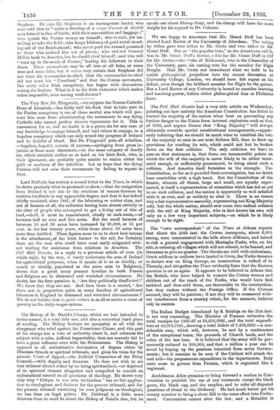The Bishop of St. David's Charge, which we had intended
to notice sooner, is a very able one, and also a somewhat hard piece of reading. The Bishop betrays no sympathy at all with the clergymen who rebel against the Conscience Clause, and this part of his charge has a tone of authority about it, and exhausts the subject with a calm, judicial impartiality, that can scarcely fail to have a great influence even with the Denisonians. The Bishop is opposed to all authoritative declaration of dogma either by Diocesan Synods or spiritual tribunals, and gives his voice for the present Court of Appeal,—the Judicial Committee of the Privy Council,—with dignity and firmness. He does not wish to see that tribunal altered either by its being spiritualized,—or deprived of its spiritual element altogether and compelled to consult an ecclesiastical council on all questions of theology. He shows very ably why " Cuique in Ina arts credendwn " has no fair applica- tion to theologians, and declares for the present tribunal, and for the present tribunal exercising its own judgment on theological, no less than on legal points. Dr. Thirlwall is a little more dolorous than he need be about the Bishop of Natal's Bill; _but he speaks out about Bishop Gray, and his charge will have the more weight for his reproof to Dr. Colenso.






























 Previous page
Previous page